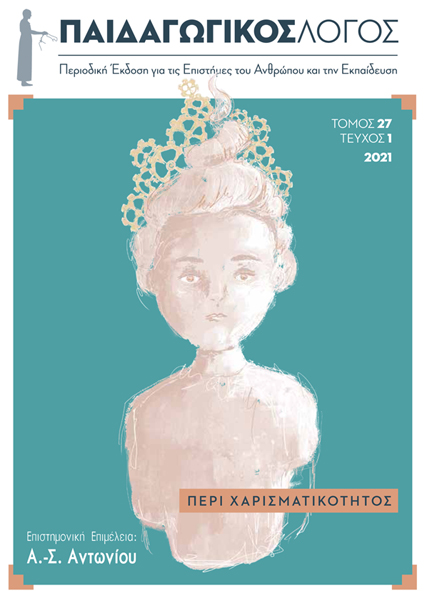Χαρισματικότητα και Πολιτισμική Ετερότητα
Résumé
Η συνεχώς αυξανόμενη ποικιλομορφία των ταλαντούχων μαθητών στις αίθουσες διδασκαλίας και τις υπηρεσίες της χαρισματικής εκπαίδευσης αποτελεί σήμερα μια διαρκή πρόκληση. Οι υφιστάμενες συνθήκες προστάζουν την αναμόρφωση των εκπαιδευτικών πολιτικών και διαδικασιών αλλά και την ανάπτυξη δεξιοτήτων και εξειδικευμένων γνώσεων εκ μέρους των εκπαιδευτικών. Τα εμπόδια και οι δυσκολίες, που αναδύονται στη χαρισματική εκπαίδευση, αναφορικά με τη χαρισματικότητα και την πολιτισμική ετερότητα, συνδέονται αφενός με τη δυσκολία εντοπισμού των χαρισματικών παιδιών, τα οποία προέρχονται από διαφορετικά πολιτιστικά περιβάλλοντα, και αφετέρου με την ένταξή τους σε ανάλογα προγράμματα. Παράλληλα, εντοπίζονται και ιδιαίτερες δυσκολίες κατανόησης της ίδιας της έννοιας της χαρισματικότητας. Βασικός αντικειμενικός σκοπός είναι να οριστούν και να προσδιοριστούν επακριβώς οι έννοιες του πολιτισμού και της χαρισματικότητας. Στη συνέχεια, επιχειρείται να γίνει η σύνδεση των δύο αυτών εννοιών και να παρουσιαστεί το αποτέλεσμα της αλληλεπίδρασής τους. Ακολούθως, να τονισθεί η αδήριτη ανάγκη για την πολιτισμική ευαισθητοποίηση και την ενημερότητα των εκπαιδευτικών, με σκοπό την επιτυχή και δίκαιη ενσωμάτωση των χαρισματικών μαθητών σε ανάλογα προγράμματα εκπαίδευσης. Επίσης, γίνεται λόγος για τον κρίσιμο και καθοριστικό ρόλο των γονέων ως συνηγόρων των χαρισματικών παιδιών από διαφορετικά πολιτισμικά πλαίσια, με σκοπό την αντιστροφή της υποεκπροσώπησης των παιδιών αυτών στα χαρισματικά εκπαιδευτικά προγράμματα.
Article Details
- Comment citer
-
Θεοδωρίτση Ι., & Αντωνίου Α.-Σ. (2021). Χαρισματικότητα και Πολιτισμική Ετερότητα. Παιδαγωγικός Λόγος, 27(1), 183–205. https://doi.org/10.12681/plogos.27928
- Rubrique
- Articles

Ce travail est disponible sous licence Creative Commons Attribution - Pas d'Utilisation Commerciale - Pas de Modification 4.0 International.
Οι Συγγραφείς που δημοσιεύουν εργασίες τους σε αυτό το περιοδικό συμφωνούν στους παρακάτω όρους:
- Οι Συγγραφείς διατηρούν τα Πνευματικά Δικαιώματα και χορηγούν στο περιοδικό το δικαίωμα της πρώτης δημοσίευσης, ενώ ταυτόχρονα τα πνευματικά δικαιώματα της εργασίας προστατεύονται σύμφωνα με την χρήση άδειας που υιοθετεί ο «Παιδαγωγικός Λόγος - Περιοδική Έκδοση για τις Επιστήμες του Ανθρώπου και την Εκπαίδευση» : Αναφορά Δημιουργού – Μη Εμπορική Χρήση – Όχι Παράγωγα Έργα 4.0 (CC BY-NC-ND). Αυτή η άδεια επιτρέπει στους άλλους να έχουν πρόσβαση στο έργο και να το μοιράζονται με άλλους, εφόσον κάνουν αναφορά σε αυτό, ωστόσο δεν μπορούν να το αλλάξουν με κανένα τρόπο ούτε να το χρησιμοποιούν για εμπορική χρήση.
- Οι συγγραφείς μπορούν να συνάπτουν ξεχωριστές και πρόσθετες συμβάσεις και συμφωνίες για τη μη αποκλειστική διανομή της εργασίας, όπως δημοσιεύτηκε στο περιοδικό αυτό (π.χ. κατάθεση σε ένα ακαδημαϊκό καταθετήριο ή δημοσίευση σε ένα βιβλίο), με την προϋπόθεση της αναγνώρισης και την αναφοράς της πρώτης δημοσίευσης σε αυτό το περιοδικό.
- Το περιοδικό επιτρέπει και ενθαρρύνει τους συγγραφείς να καταθέτουν τις εργασίες τους μέσω διαδικτύου (π.χ. σε ένα ακαδημαϊκό καταθετήριο ή στους προσωπικές τους ιστοσελίδες) πριν και μετά από τις διαδικασίες της δημοσίευσης, καθώς αυτό μπορεί να οδηγήσει σε παραγωγική ανταλλαγή ιδεών και σκέψεων, καθώς επίσης και σε γρηγορότερη και μεγαλύτερη χρήση και ευρετηρίαση της δημοσιευμένης εργασίας



